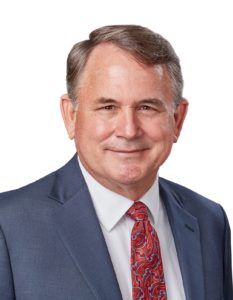
 The Resilient Floor Covering Association (RFCI) continues to play a vital role in the advancement of the category, supporting its members through avenues such as advocacy and messaging, particularly in the area of sustainability. It also gets involves in setting standards to ensure product quality meets consumers’ expectations. Now Dean Thompson, who has led RFCI for the past 15 years, is set to retire with industry veteran Bill Blackstock set to lead the charge into the future. FCNews publisher, Steven Feldman, sat down with both men recently for a wide-ranging interview.
The Resilient Floor Covering Association (RFCI) continues to play a vital role in the advancement of the category, supporting its members through avenues such as advocacy and messaging, particularly in the area of sustainability. It also gets involves in setting standards to ensure product quality meets consumers’ expectations. Now Dean Thompson, who has led RFCI for the past 15 years, is set to retire with industry veteran Bill Blackstock set to lead the charge into the future. FCNews publisher, Steven Feldman, sat down with both men recently for a wide-ranging interview.
What has RFCI been up to over the last year?
Dean Thompson: The most important thing is to talk about our leadership transformation and its relevancy. I decided two years ago that, after 50-plus years in the industry, it was time to step aside. Most importantly was my compelling desire to make sure that future RFCI leadership would be able to maintain and add on to its legacy, so I took on the responsibility of recruiting and recommending to the RFCI board an outstanding successor in Bill Blackstock. Bill assumed my role of president & CEO on Jan. 1, and I will stay on as president emeritus through June 2022.
Why is Bill the right person to lead this organization for the foreseeable future?
Thompson: Several things. First, over the past 20 years, Bill has demonstrated impeccable character and leadership, and he has an exceptional reputation. We wanted somebody with great industry experience at the manufacturing level, and Bill comes to RFCI with more than 20 years of leadership experience under his belt having spent time at Milliken, J&J and Engineered Floors.
Bill, what made this position attractive to you?
Blackstock: I’ve been in flooring almost 25 years. What makes this position attractive is the opportunity to engage a very diverse membership and to be associated with the fastest growing product category in flooring. Also, RFCI has always positively impacted the membership and industry. We will strive to continue doing this in the years to come.
You come on board when your membership is facing challenges, whether it be supply chain, raw materials, etc.
Blackstock: First, Dean and the board provided a short period for me to scale into the role prior to becoming president of RFCI and a period afterwards, with Dean being president emeritus of RFCI. With the breadth of the organizational reach of RFCI, we knew this overlap would be vital from a continuity perspective. The time has allowed me to engage a host of people inside the industry and thought leaders outside the industry as well. Second, RFCI has always been a part of engaging the key issues of resilient products. This approach continues in all we do, especially during this complex period.
Why does the raw material shortage exist today, and how do you see it dissipating?
Thompson: I think from a raw materials shortage standpoint, there is enough global capacity to fill the demand we have. Tremendous post-pandemic re-inventorying by many industries coupled with labor and other issues created a bottleneck in terms of supply of finished product and raw materials. Manufacturers are having to operate in an environment of reduced service and rising costs. The underlying problem is not a lack of capacity, it’s being able to get that capacity up to a level where it’s delivering product as we knew it, and that’s going to take a while. We are seeing a tremendous bottleneck moving its way forward very slowly. I think the market demand is there, and when the market demand is there the supply chain issue will be solved by basic market inertia. With that said, I don’t think there’s a very strong role RFCI can play in that, per se, other than supporting our members and continuing to do what we are doing in terms of helping stimulate awareness and managing key issues. We may get some relief as added domestic capacity and warehousing comes on stream for our industry although, while added domestic capacity will provide some service improvements, supply chain issues will continue to be a challenge for the next several months and perhaps beyond as the resilient sector will continue to be highly dependent on off-shore sourcing.
One of the things that RFCI always talk about is advocacy. Any issues that RFCI has been involved with in Washington, D.C. over the last year?
Thompson: When we think about advocacy we have to consider what is taking place at various levels. There are issues that emanate from a variety of sources, including federal and state government agencies as well as non-governmental entities. RFCI has a comprehensive monitoring process in place at all levels and stands ready to take appropriate action as necessary. Fortunately, we don’t have to go it alone as most are big-picture issues with broad impact. RFCI is very closely tied with other organizations such as the Vinyl Institute, American Chemistry Council and the National Association of Manufacturers which provides a collaborative network and the opportunity to place those issues on a broad economic and employment platform when making our arguments with regulators and others. There are several federal issues that are in the making, including regulatory issues to impose taxes on PVC resin, which is a problem as that would likely increase the cost of a very key raw material. This is symptomatic of some of the current policies of tax and spend we are having to deal with.
At the state level there are several issues, including the state of Washington and its Safer Products for Washington law under which ortho-phthalates in vinyl flooring are considered problematic. The good news is that the flooring industry began moving to alternative plasticizers several years ago and we are working hard with the state of Washington to demonstrate the validity of that initiative. The state of New York has regulatory measures that discriminate against PVC products. Working with our strategic partners, the American Chemistry Council and the Vinyl Institute, we continue to challenge those measures.
Is the big issue, generally speaking, classifying PVC as a negative ingredient in products?
Thompson: That is no longer a significant issue. First of all, the market gravitates to those products with the best overall value proposition and the fact that resilient flooring—which is 95% PVC based—has increased over the past dozen years from 9% to nearly 30% of the flooring market speaks volumes. Positive considerations for using PVC have come a long way over the past several years, which is documented in key research with the architectural and design community. Furthermore, one of the reasons PVC was considered problematic was related to the use of ortho-phthalates, which is a class of plasticizers used to make PVC flexible. Based on alternative assessments, the flooring industry discontinued the use of ortho-phthalates so that concern was eliminated. In addition, the use of PVC in durable products such as vinyl flooring is regarded as a strong contributor to creating products with very long life spans, and extended life is considered a very high priority on the environmental hierarchy of reduce, reuse and recycle. Now, durable products like flooring, roofing, doors and windows that are made with PVC are viewed differently than non-durable products like flexible packaging and other disposable products.
Is there one issue that RFCI is most concerned about today?
Thompson: There are two. Long-term, I include recycling because of the global emphasis centered on the circular economy strategy. To help advance the work of RFCI is this area, we formed a Recycling Research Committee with a detailed charter and set of objectives. Recycling is a much bigger issue than flooring alone which is why we are taking a research-based approach and are engaged with key supply chain members, the Vinyl Sustainability Council, the American Chemistry Council, the Plastics Organization and the European Resilient Flooring Manufacturing Institute where there is common interest on recycling, whether it’s infrastructure for collection or advanced chemical technologies for recycling at the molecular level.
Another issue that is a constraint to growth is the availability of installation labor. RFCI took a leading role over three years ago in championing with WFCA a research project that provided a solid base of facts and data related to the long-term impact of this problem. This research helped unite the industry, and one of the key recommendations of having a separate organization to focus on this initiative is now under way through the Floor Covering Education Foundation.
RFCI launched a marketing campaign a few years back; what were the results of it?
Thompson: Back in 2019, we worked at re-examining the RFCI strategic plan as we realized that with tremendous growth comes tremendous responsibility to help sustain and build on the growth we have achieved. One of those opportunities was to make sure we had a good handle on how our message was being perceived in the marketplace. To accomplish this, we engaged in research and found that the consumer’s level of interest in terms of their views about sustainability and selecting products that had strong environmental attributes had grown dramatically. With that background, it was determined that we needed to better understand and communicate our sustainability message. The first step was to form a marketing committee to help ensure this investment would provide synergy with our members.
RFCI manufacturers are doing a lot from an environmental and sustainability perspective and to capitalize on that we needed to communicate what the industry is doing collectively around environmental initiatives. So, we decided to craft a message that would enable RFCI and our members to communicate these important elements. We developed “Beautifully Responsible” as the umbrella social media campaign that has three key messaging pillars: Mindful Manufacturing, which has to do with the collective sustainability work of our manufacturers; Living Well, which is all about the health and safety attributes of our products; and Made for Life, which is all about the performance attributes of our products.
RFCI gets involved with standards. Has RFCI been active in developing standards for this waterproof SPC category?
Thompson: Absolutely. When we merged MFA into RFCI, we formed a multi-layer flooring board advisory committee to work on this product category. There is a sub-technical group, which developed ASTM-3261, the performance standard for rigid core flooring, including waterproof. Our interest was to have a standard that would help ensure the quality of rigid core products going forward because we know there is a tremendous influx of new suppliers and products entering this category. We continued to enhance that standard and its attributes with a new third-party certification, Assure Certified.
Are things looking up on the supply chain side?
Thompson: I think that long-term probably yes, but short-term probably no.
Bill, what’s your vision for this group going forward as you take over for Dean?
Blackstock: This organization is so finely tuned now. I don’t want to do anything to disrupt that. We have a clear strategic plan and implementation model. My early focus in 2022 will be on implementation. Membership participation in establishing the strategy has been incredible as has their passion for implementation. In my entire career I have never seen more factors at play in the global economy as there are right now. So, one of the key challenges for Dean and me in this time of great change is helping bring value by identifying and engaging a number of organizations and subject matter experts who can help with understanding and clarity.
What percentage of resilient sales in North America are represented by RFCI members today versus 15 years ago?
Thompson: I would say 15 years ago RFCI represented maybe 85% to 90% of industry sales. Today RFCI represents approximately 95% of North American sales so the percentage has changed some but as the industry has grown so has our circle of manufacturers. A key difference though is that 15 years ago the RFCI manufacturing members included only domestic producers, whereas today we embrace those who produce anywhere in the world and sell into the North American market.
Who are some of the newer RFCI members?
Thompson: On the manufacturing side that would include CFL, Torlys, Wellmade, Engineered Flooring and, most recently, MSI. While they have been a RFCI associate member for some time, Interface recently joined as an RFCI board member. On the RFCI supply chain member side, i4F, Baerlocher and Valtis Specialty Chemicals are recent additions.
Bill, what excites you about this industry?
Blackstock: It’s the level of innovation that is taking place. There was a great futurist 30 years ago who said that the seeds of new paradigm shifts are planted during rapid acceleration of the existing paradigm. The seeds for future innovation in resilient are all around us. I believe excitement about resilient products will continue for many years to come because of the industry’s dedication to innovation.
SPC, rigid core has always been a value product. As you’ve witnessed manufacturers enact at least three price increases last year with more coming this year, are you concerned the price/value relationship as compared to other products starts shrinking?
Thompson: That is a valid concern. However, I think we saw when tariffs were first implemented, the supply chain and the manufacturers were able to absorb most of it. Today the tariff level is still out there at 25%, and the value proposition of the product continues to carry the weight of the tariffs. If you think about the consumer purchasing frequency, making a flooring purchase is something they very seldom experience. Consumers who are planning to buy today will make a purchase decision based on their best understanding of the value proposition of the product being offered now.

